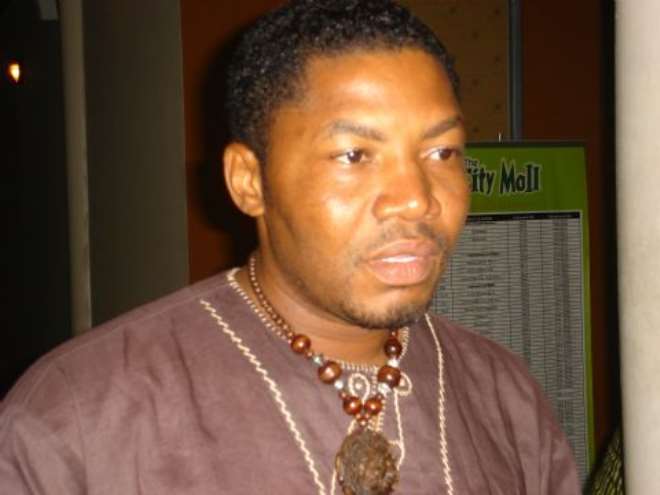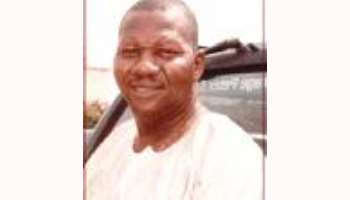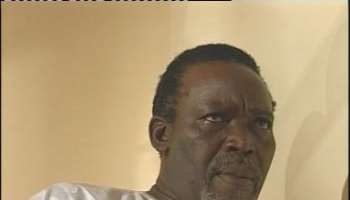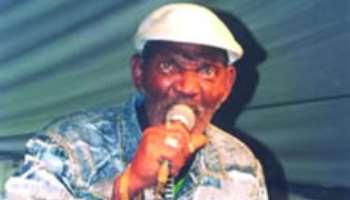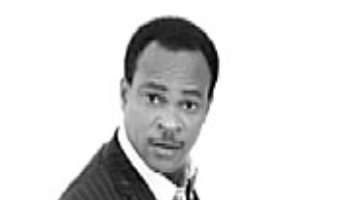I'M FULFILED —ERNEST OBI
Q: Ernest, for sometime now , your face has not been visible in movies unlike before. What has been responsible for this?
A: It is due to the fact that for years now I have been involved in film directing. I think that's why I have not really done anything concerning acting per se. But I have done one or two films. As I always say, I can decide to act if the script is good and if it is not, I won't bother. I believe one will get to a level where you don't just act for acting sake. Your job should speak for you because you have attained a greater height on your career. As an actor, you must do a good job, so if you do it for the money involved, at the end of the day, you will mess up the whole thing. Besides the fact that I have moved on from acting to directing and producing, I still act, but only if the script is good.
Q: So, you have found only two good scripts since you delved into directing and producing?
A: No. Actually I have done quite a number of films but may be it is because I did not feature prominently in them. Unlike some people who will insist on playing the lead role, I don't do that. I can play the sub-level role and try as much as possible to overshadowed the lead character.
Q: You said earlier that since you delved into directing and producing few years ago, you have only considered acting a few times. Is that why you also stopped acting in Yoruba films?
A: In Yoruba film production, the situation is always different from English film production.
Q: How?
A: Yoruba film production has its own uniqueness. I don't know if there is any better words to use. I have done about three Yoruba films- Oku Alejo, Nkan Nla and another one- and I think they are very good stories.
And in the area of acting in their sector, I have had a number of them coming to me to say: “Ernest, jo wa ba mi se ise yi (meaning, Ernest, please come and work with me). In most cases, they don't have script and they will want you to improvise; and I am not down with that. I work with a few people who respect professionalism among the Yoruba practitioners because some do not. They just want you to come and do a hush-hush job, earn your money and go.
Q: How would you assess the technical aspect of film production in both genres?
A: Technically, English films are better. When it has to do with some Yoruba films involving people like T.K. Tunde Kelani, Tade Ogidan and their crew, you tend to have a superb production. Though some English films do not measure up to the quality of Some Yoruba films, the English films have better technical approach to film making. But the Yoruba have an advantage. They have good stories and I always wonder where they get their stories from.
Q: They have better stories than their Igbo counterparts?
A: I don't mean better but they have fantastic stories. Okay? It is the treatment given to their stories that is the problem. I think this is due to their working condition. Most people do not get paid because they are always begging one another to do a film. It is like a trade by barter. So, most times the actors don't put in their best because they are not going to earn much from the project. That means If I am coming to work with you, I have to work according to your terms and which may not favour me. Most of the films that are professionally done depend on the budget. You will discover that monetarily, English films are better.
Q: Having said all these, what are the challenges those of you who crossed from the Igbo genre of the industry face among the Yoruba practitioners?
A: Initially, they was animosity because they did not see me as an English actor but an Igbo actor. A lot of them did not believe I could actually speak Yoruba. Most of them thought I was there to be taught how to speak the language. Because of this, it was not funny convincing them and because of my kind of person, I was able to scale the hurdles.
Q: What attracted you to work with the Yoruba practitioners?
A: It was not an attraction. It was an old school mate of mine, Doyin Owobamirin, who is based in Abeokuta that came to me and told me a friend of his wanted to work with me in his flick Oku Alejo. When he told me about it, I turned down the offer but he persuaded me that “Obi, jo wa se” meaning “Obi, please give it a try" and I decided to do the job. And you too can testify like every other movie critic that the film was wonderful.
Q: Do you have any Yoruba background?
A: No, but I grew up in Lagos. I am a proud Igbo man. My parents are both Igbos and while growing up, 98 percent of my friends were Yorubas. So, I grew up speaking more Yoruba than Igbo but I also speak Igbo with pride.
Q: How did you imbibe the Yoruba culture because last year, you surprised everyone at the African Movie Academy Awards (AMAA) as you were dressed in a 'Buba' and 'Kembe' (Yoruba ceremonial attire)?
A: The 'kembe' thing was a costume I wanted to wear because I wanted to distinguish myself from others. Maybe because I felt like stepping out in a Yoruba way. Such costume is worn by Yoruba elders who are rich cocoa traders and I just decided to dress that way because I had the picture in my brain before the ceremony.
Q: So, how did you feel wearing it?
A: I was so proud of myself because a lot of people told me it as so beautiful. Actually, I grew up loving the Yoruba culture.
Q: Can we now say you are fulfilled as a producer/director and not as an actor?
A: Based on what we have, I think I have done it all. I have practically played every role. I have played a pampered and maltreated child, I have played a drug addict, rapist, street boy. I have danced naked in the street. I have also washed undies, played a cleric; acted as somebody's husband and lots more. So, I think my versatility and dynamism have made me play every role. So, I am fulfilled as an actor.
Q: But one role you have never played is that of an old man?
A: Yes, the reason is because of the kind of make up we have here. Basically, our technology has not gotten to that level and that's why I said I have played virtually all roles based on what we have. Actually, I majored in directing while in school, but I decided to practise my first passion, which is acting. And that has always been helping me on set, while directing because when I tell an actor to do a certain thing and he argues, he definitely knows I can do it because I am an actor.
Q: Nollywood is rated as the third biggest industry in the world and it seems not to have some internal structures in place. How do you assess the industry?
A: As I always tell people, we have done so much from nothing: we actually got to this level from the scratch because we had no structure in place when we started. People like the great Hubert Ogunde, Moses Adejumo a.k.a. Baba Sala, I Show Pepper, Eddie Ugbomah and Co. started with cinematography and because it could not work out, the video thing came in through people who had the passion for film making. People like Kenneth Nnebue (owner of Nek Video Links), and others. For instance, Nnebue shot one of the first Yoruba films, Aje Ni Iya Mi. He started shooting Yoruba films before producing English films. These were individuals who only had passion for the industry without support from the government and corporate bodies. These were young and old men who took the risk of shooting films without hope for profits. So, it's like a miracle because the industry is just about 15 years old and that is why I laugh and tell people that there is no room for comparison whenever they say “why don't your films look like those shot in Hollywood? In the first place, what is the budget like?
In Hollywood, they shoot their films with a budget of about $60 million, $80 million or even $100 million. But here, we shoot films with a budget of N6 million or N8 million. This is owned by individuals.
And the country is not too conducive with the kind of electricity supply we have. How would you expect people to go out and buy a film and later switch on the generating set only to watch a film, after being on a long queue at the filling station? So, I can tell you that it takes guts to have been in the industry all these years. We have actually been performing magic in 15 years. America celebrated 100 years of film making a few years ago, India did the same recently. But we are barely 15 years old and we are rated the third best in the world.
Q: Most producers and directors believe the budget of a film, determines how long the shooting will go. Do you agree?
A: Well, I think it depends on the story. It is possible to shoot a film within a week. That depends on the story. I know a guy called Oliver. He's a white man but married to a Nigerian girl. And can you believe that the guy actually came down here to study how to shoot low budget films?
So, that means what we are doing is right. If people shoot a film for 30 days or 14 days, it depends on the story. That makes us unique. For us here, we don't shoot films for the elite but for the common man. For instance, an elite would not believe that somebody's manhood can be stolen. But it happens on a daily basis in Oshodi.
Q: A lot of mediocrity have dominated the industry. But as a professional actor, what does it take to be a professional in the Nigerian film industry?
A: What makes you a professional? People say you must go to a film school. For me, I read Dramatic Arts. I must tell you that it does not mean that you must study Dramatic Arts before becoming a professonal. It has to do with passion and that's all. Even somebody from the street can become a good actor if he has the passion to act. Yoruba actors are one of the best because they are language actors and it makes them deliver in-depth message to the viewers.
Q; Some of your colleagues have said that the 'English' film makers are supposed to be regarded as Igbo actors. What's your opinion about that?
A: With due respect to my Yoruba colleagues, they are always fond of calling English actors Igbo actors because that sector of the industry was started mostly by Igbo actors before it became a level playing ground for everybody. We shoot 'English' films and I can tell you that we don't shoot Igbo films anymore. The likes of Jide Kosoko, Ramsey Tokuboh Noah, Omotola-Ekeinde and Shola Shobowale are wonderful actors and actresses and they have also acted with us.
Ramsey is Yoruba and we all know that he is one of the highest paid actors in Nigeria today. Now, all these people are a force to reckon with in the English genre of Nollywood. RMD is not Igbo and he's doing well.
Since the films are not Igbo, most times they have Igbo setting and sound tracks. What's your view on this?
It depends on the background. And again he who pays the piper calls the tune. Commercially, films don't sell well in Lagos. People in the South-West of Nigeria don't buy films because they prefer to rent it. They get stories for the Eastern areas because they know that most of them buy films. They shoot the movies to make them feel they are part of it. That's why it looks as if they shoot movies with Igbo background, soundtrack and even the names.
Q: Finally, can we say the industry we have now is that of your dreams?
A: No. And that's because the passion has dropped. The passion is not there anymore and as I told you, I have a problem with getting just any script to work on because, at the end of the day, you will discover that those you have worked with are not the right people. What actors now run after is money and alas, this lack of passion can kill the industry. We need to salvage it.
—Olatunji Saliu and Lois Okereke.
Latest News
-
 "If You're For Me, I Am For You" - Cubana Chief P
"If You're For Me, I Am For You" - Cubana Chief P -
 "3 Days To Go" - Femi Adebayo Urges Fans To Get S
"3 Days To Go" - Femi Adebayo Urges Fans To Get S -
 "Stop Asking Me Questions About Speed Darlington"
"Stop Asking Me Questions About Speed Darlington" -
 "Benue Is The Most Underdeveloped State I've Ever
"Benue Is The Most Underdeveloped State I've Ever -
 Stan Alieke Urges Young Professionals To Take Lin
Stan Alieke Urges Young Professionals To Take Lin -
 Chizzy Alichi Teases Fans With Baby Reveal, Promot
Chizzy Alichi Teases Fans With Baby Reveal, Promot -
 "I'm Not Wearing Makeup From July 4th Till Decemb
"I'm Not Wearing Makeup From July 4th Till Decemb -
 "Stop The Challenge Of Mocking Kids With Down Syn
"Stop The Challenge Of Mocking Kids With Down Syn -
 Regina Daniels Celebrates Sons As They Mark Birthd
Regina Daniels Celebrates Sons As They Mark Birthd -
 Speed Darlington Threatens To Sue NAPTIP For Defam
Speed Darlington Threatens To Sue NAPTIP For Defam


